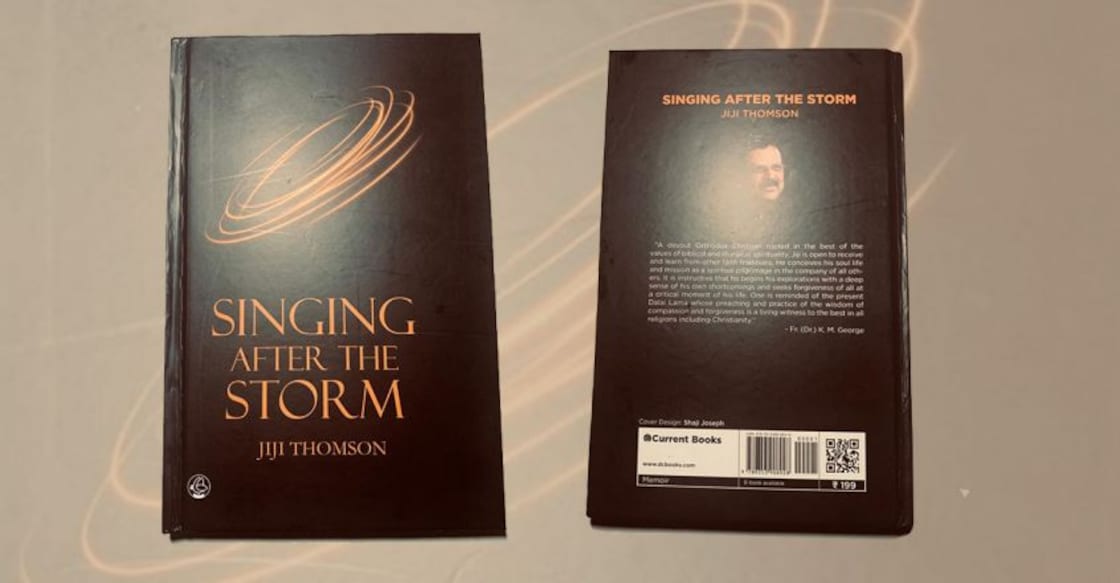Jiji Thomson's book is a charming dialogue on life, love and faith

Mail This Article
The lockdown and the reverse quarantine have played havoc with my routine. The flexibility of work from home has changed the timings of daily activities, like walking, shower, meals and naps. Reading, writing and ‘webinaring’ fill the rest of the waking hours these days.
The other day, I was getting ready for a late shower as I had no webinar that morning, when the phone rang and at the other end was Jiji Thomson. He is my baby brother’s batchmate and I see him as I see Seetharam, even though they had become former Chief Secretary and former Ambassador respectively. I instinctively congratulated Jiji on his new book, ‘Singing after the Storm,’ recently released by Shrimati Sugathakumari by giving a copy to former Kerala chief minister Shri Oommen Chandy at the former’s home. I also had watched Jiji answering questions on TV of two damsels, who had not obviously read the book. I had realized that the book was on a day’s events which took him close to death and brought him back, about which I had heard from friends.
Jiji told me that he was calling to inform me that he was sending a copy of his book. He would have come personally, but social distancing dictated that it should be sent by messenger. I said I would have gladly bought a copy as soon as I was liberated from my voluntary quarantine. I also added that I believed in buying books from friends rather than get them as gifts. I joked with him that my dream was to write a book, the royalty for which should exceed the price of the copies I purchase for sending to relatives and friends.
Jiji insisted that he would send a copy straightaway.
That momentous day
I waited for the book out of curiosity and began turning the pages, delaying the shower further. I read Part 1 of the book, a very absorbing account of the events of the day in Kochi which landed him in a hospital with a serious cardiac condition. Everything was providential, particularly that he happened to stay in a hotel close to a hospital in the same room with Raghuchandran Nair, a common friend, who has the reputation of being one of the most kind and gracious “Good Samaritan” to all. He is present wherever help is needed with a calm smiling face and reassurance. Raghu was at his best to reach Jiji to hospital driving the hotel car at high speed in the rain to save his friend’s life.
Part 1 is a masterly reconstruction of the events with the skill of a gifted storyteller. Even if the book had consisted only of that story and Part 3, which recounts the aftermath and lessons learnt, it would have been worthwhile.
Author's dreamy spiritual trip
Part 2 of the book elevates it to the height of spiritual dialogue, in which “Jiji, with his ever-creative mind, has woven out of his life-and-death experience a touching spiritual autobiography with a series of severe theological and philosophical ruminations. He has raised pertinent questions that any sensitive individual who seeks the meaning of life in our contemporary socio-political and religious context would gratefully share,” says Fr. (Dr.) K.M.George in the Foreword.
In an imaginary conversation with a Guruji, a Christian priest in saffron clothes whom he encounters in Kashmir, he explores the meaning of life, truth, faith, hope and love. The conversation is reminiscent of the dialogues of Krishna and Arjuna, Socrates and Plato, Nachiketa and Yama and Sankaracharya and Mandana Misra. A virtual Kurukshetra dialogue all over again!
The dialogue fits in beautifully as a dream sequence at the time when doctors were working on his heart to bring him back to life. All the thoughts which he has expressed tell the story of his whole life, his spiritual beliefs, erudition, wide reading and experience. He would have probably penned them at one time or another, but using the peg of his most unfortunate health episode gives the narration a particular poignancy and authenticity.
The story is one of a devout Orthodox Christian rooted in the best of the values of biblical and liturgical spirituality, but he is at ease with the maxims of Hinduism, Islam, Sufism and even Marxism. He is convinced about the philosophy of "Vasudhaiva Kutumbakam” and “Thatvamasi” even as he elaborates his Christian faith.
On Christianity in India
The fascinating section entitled “Christianity’s Failure to flourish in India” establishes with several examples that “because of the large-heartedness of the Hindus, who welcomed different religions with both hands, India became a melting pot of different faiths.” This is much more benign than the theory that the clever Hindus fought other religions by arguing that all religions are one and conversion to any other religion was unnecessary to reach God. He recalls Swami Vivekananda’s confession about Christ: “I would have washed his feet not with tears, but with my heart’s blood.” Jiji records that Swamiji pitied the Hindus, who did not see the beauty of Jesus Christ’s character and the Christians who did not pay reverence to the Hindu Gods.
On new lease of life
Part 3 is the delightful part of the book where the readers will join in the celebration of Jiji’s new life. We will agree with his conclusion, “Torrential rain or devastating storm will cause you no harm. For He is captaining your ship! So rejoice and keep singing! Sing after every storm.” More power to his elbow in his second innings.
I did not regret that my shower got late, but I am grateful to Jiji Thomson for ninety pages of wisdom and prayers between two elegant covers, which I read in one sitting.


